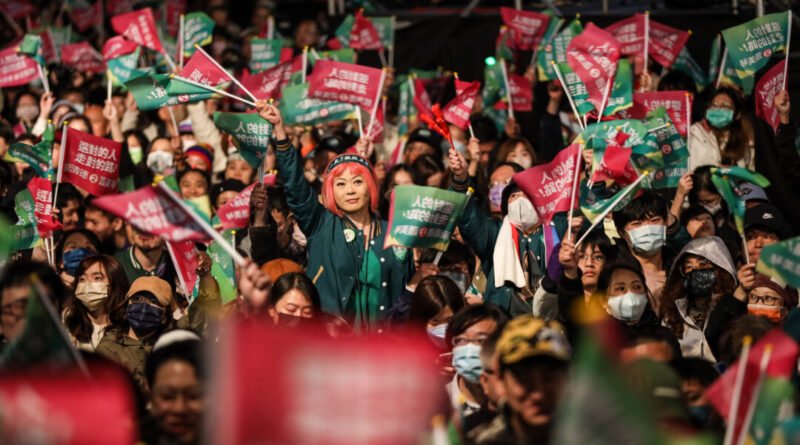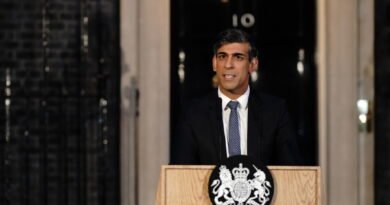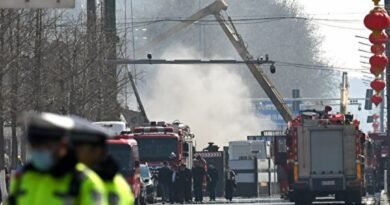Experts Believe Taiwan’s Election Outcome Could Trigger Significant Political Transformation in China
The public in mainland China, living under the CCP’s socialist rule, are calling for unification of ‘One China’ under Taiwan’s liberal democratic system.
As Taiwan’s presidential election concluded on Jan. 13—with the pro-democracy William Lai Ching-te elected as the new president and Hsiao Bi-khim as the vice president—observers have anticipated that the mature democracy displayed in Taiwan’s election process may lead to calls for fundamental political changes in China.
Mainland Chinese media, which is controlled and censored by the ruling Chinese Communist Party (CCP), didn’t cover Taiwan’s election day voting, although mainland Chinese citizens were searching for live reports online. One netizen among many similar voices complained on China-based social media platform Weibo asking: “Today is the voting day for the Taiwan election? Why is there no news report!”
Jin Zhong, editor-in-chief of the Hong Kong political periodical Open Magazine, told The Epoch Times that the CCP is afraid that the scenes of Taiwan’s election—with citizens’ full participation—will be seen by mainlanders and inspire them to think, “‘Taiwan can do it, why can’t we?’ This is very detrimental to authoritarian rule.”
“The CCP doesn’t allow the entire process of Taiwan’s election to be known to mainland Chinese. CCTV, their websites, and newspapers all reported it negatively, saying nonsense like that the DPP [Democratic Progressive Party] is seeking Taiwan independence.”
International media, Taiwan’s local media, and social media covered the campaign activities of all three parties who held open debates with one another in public.
Mr. Jin pointed out Taiwan’s general election demonstrated the Taiwanese citizens’s excellent civic mindedness, enthusiastic public speaking, street canvassing, and teamwork skills.
He said that Taiwan’s general election has fulfilled Sun Yat-sen’s Three People’s Principles of selecting the virtuous and the capable: “selecting those who are virtuous, clean, non-corrupt, and of good moral character; the second is capability, which means having the ability to work and lead. The policies and programs proposed by them can be accepted by the people. The Chinese people on the mainland see this clearly.”
international recognition.
Mr. Jin compared that it has been 75 years since the communist regime that calls itself the People’s Republic of China was established in 1949. “China has been under dictatorship for three-quarters of a century and the people have no rights. Not only do they not have the right to have one vote each person, they also have no right to speak. If they say a word of wanting democracy or criticizing the one-party dictatorship of the CCP, they will be punished immediately.”
“Taiwan’s democratic system can influence mainland China, and the Chinese people will demand that we also hold elections, so the CCP is not able to sit still,” Mr. Jin said. ”And that’s why they’ve tried to meddle with Taiwan’s election and not to report the campaign and the voting process.”
Chen Kuide, executive chairman of the Princeton China Initiative, told The Epoch Times that he also went to Taiwan to observe the election and attended a conference titled, “How Taiwan’s Democratic Politics Leads China’s Political Changes.”
Mr. Chen said, “The Republic of China, an old state, has actually carved out a new destiny in Taiwan. If Taiwan can do so, why can’t mainland China? From all aspects, it is a great inspiration to the Chinese people.”
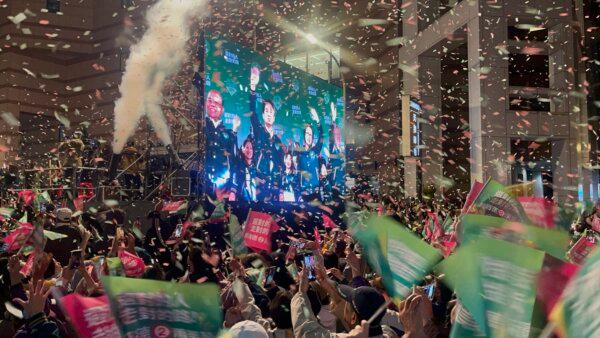
He pointed out that the competition between the two systems across the Taiwan Strait has clearly demonstrated that Beijing’s political approach of suppressing human rights and expanding externally has no future.
“What the CCP is most afraid of is not that China will not be unified. It is afraid that Taiwan will truly pose a fundamental challenge to the [communist] system of mainland China,” he said.
The CCP’s unification is “to get Taiwan into its system and use all means possible to destroy Taiwan,” he added.
During the election, the CCP used various methods to intimidate the Taiwanese people, such as civil and military threats, launching rockets, using AI to influence voters, promoting pro-CCP viewpoints to young Taiwanese voters on TikTok, and economic coercion.
Mr. Chen said that the CCP also knows that, no matter what method it adopts, it cannot stop Taiwan’s elections. It also knows that as it interferes, its actions may “even have a counterproductive effect, strengthening the Taiwanese people’s determination to pursue a way of freedom and survival.”
Mainland Calls to Unify China Under Taiwan’s System
Many mainland Chinese expressed their support for Taiwan’s liberal democratic values on social media. One congratulated the Taiwanese people: “Taiwanese people have become the masters of their own country through their votes and achieved fairness and justice. Congratulations to the people of Taiwan!”
Another said, “One person, one vote to elect president started since 1996,” when Taiwan held its first presidential election.
Mr. Li, a professor in Beijing, told The Epoch Times, “In reality, China and Taiwan are two separate countries, and Taiwan represents the Republic of China. This is a fact. Taiwan is not electing a governor of China, but is electing its president.”
“If Taiwan were to be unified by the CCP, then Taiwan, as the only place where the Chinese nation can have modern civilization, will no longer exist. Hong Kong is an example,” he lamented.

Mr. Li said that mainland China has not moved towards modern civilization under the CCP’s one-party dictatorship. “Officials of the CCP are well aware of this, but they dare not speak out and cannot reverse this situation. But sometimes it only needs a trigger for things to happen. The former Soviet Union was so huge, but didn’t it fall over night?”
Mr. Tong, a retired public security officer in mainland China, said that Taiwan is a model for China’s future democratic elections and that Taiwan’s electoral system can be moved to the mainland in the future.
“Once mainland China undergoes democratic transition, it needs a role model and a mature electoral system and procedures,” he said.
Ms. Liu, an employee of a state-owned enterprise in Baotou, Inner Mongolia, told The Epoch Times that if unified, the CCP’s political system must change from a one-party dictatorship to a system of multi-party governance, with multiple candidates running for election.
“China’s current environment and entire system must be transformed into Taiwan’s system, only in this way can both sides of the Taiwan Strait have a basis for reunification,” he said.
‘On the Road’ vs. ‘Always on the Road’
Meanwhile, many Chinese had fun making comparisons between Mr. Lai’s campaign video “On the Road” and the CCP’s follow up propaganda piece “Always on the Road.” The social media trend attracted wide attention for how it represents what many informed Chinese see as the fundamental difference in the mindset and practice between a liberal democracy and dictatorship.
The short video “On the Road,” which had had tens of millions views since it was posted on Jan. 2, featured a road trip of Taiwan’s current president Tsai ing-wen and vice president Mr. Lai, who is now president-elect. It started with Ms. Tsai driving a car and Mr. Lai in the passenger seat, and the pair conversing about Taiwan’s democracy and its development over the past four years.
Ms. Tsai then gives her car keys to Mr. Lai before she gets out of the car. Mr. Lai takes the keys and a phrase, “pass the baton” appears on the screen. Afterwards, Mr. Lai is seen in the driver’s seat, and his campaign partner, vice presidential candidate Ms. Hsiao gets into the car taking the passenger seat next to him. Ms. Tsai is standing on the road next to the car smiling and waving at them, while Mr. Lai and Ms. Hsiao drive away. The video received overwhelmingly positive reviews for its clear and simple message of democracy.
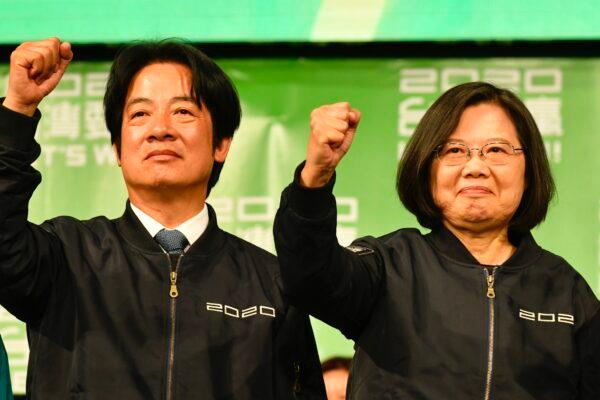
A few days later, on Jan. 8, the CCP’s official media published an article “Always on the Road” to review
Source link

